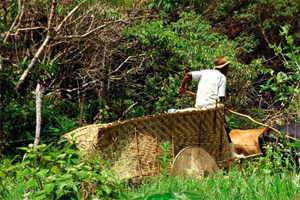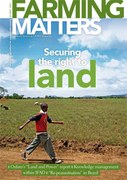The enormous number of people living below the poverty line, the current food crisis and the land grabbing processes currently taking place throughout the world, show clearly that conventional economic wisdom does not always follow common sense. There are more than enough arguments for further developing the smart model of millions of small-scale farmers.
Land is a crucial asset for people all over the world. But land is not only

an economic asset: it is the means to ensure sustainable livelihoods and the economic is just one of its numerous values.
However, when others, such as foreign investors, arrive with other legal frameworks, titles become of immense importance. These titles and ownership structures differ from common practice in the countries where land grabs are going on at this very moment.
Clashing systems: the common good and the individual interest
Many non-Western cultures and value systems are built on the premise that what is good for the collective is good for the individual, and this is constituted in customary systems. Customary land tenure is made up of rules that regulate behaviour and relations towards land, including trees or watering holes, which have been built upon local and often traditional social norms and networks. As described by Elinor Ostrom, the 2009 Nobel laureate for economics, these tend to be embedded in the desire for a sharing of resources for the good of the community, rather than for the individual. This is very different from the system of individual ownership and capital accumulation that comes with the current wave of so-called investments and land acquisitions.
Pastoralists, fisher folk, indigenous people, or most people in rural areas, know no better than that natural resources belong to everyone, or to some spiritual unit, and are not to be tampered with. It is an eco-centric outlook on life whereby people are part of nature, as opposed to the anthropocentric approach which dominates Western cultures, whereby people are at the centre and nature is there to serve us. The “we belong to the earth” or “the earth belongs to us” paradigms are very deeply entrenched, resulting in fundamentally different beliefs and value systems. These different worlds and value systems are now meeting each other very rapidly and creating huge and unprecedented tensions to the detriment of those living in poverty.
Are we in a necessary transition period, which will lead to us having the best of both worlds? Or will one model win over the other, leaving damage control as the only option? The current land grabs give one the feeling that the latter is the case: the western/capitalist/ individualistic model will win, and the best we can do is to reduce the ensuing damage. However, the optimistic picture is that the multiple crises we are in, especially in Europe and North America, are a massive call for sustainability, corporate social responsibility, and for dismantling corporate power. Researchers, academics and, notably, many practitioners, are collecting evidence and arguing that our system of individual ownership and capital accumulation is not necessarily the best system or the highest achievable: other systems can work very well, and in many cases, even better. All this gives hope.
Common sense and common economic wisdom
Common sense tells us that everybody needs to eat, and if food prices go up, one still needs to eat. Food is not like a mobile phone or a new dress whose purchase can be postponed. People need to eat everyday. Common sense tells us that 1 billion people living in poverty is unacceptable. Common sense tells us that if we put food into our cars, food prices will go up. Common sense tells us that we all want a good future for our children.
Conventional economic wisdom teaches us the opposite. It teaches us that economic growth is an essential means for the creation of wealth; conventional economic wisdom teaches us that it is OK to plunder the world’s natural resources, to individualise profit and socialise losses. Common economic wisdom teaches us that, at the end of the day, everyone will choose for their own short-term benefit (as Garret Hardin argued in his 1968 “Tragedy of the Commons”).
As argued earlier, there are other value systems that lead to very different ways of looking at wealth creation, particularly in Africa. We see value systems there that are based on re-distribution of wealth, and not so much on growth. These value systems are based on the common good, but also on deriving rights. They define human existence on the basis of relationships and not just on the basis of property. These systems are based on cycles of life in which creation/birth, preservation and destruction/death are all equally important. Again, this is rather different from a system in which individual property and individual ownership are the highest achievable aims. Combined with our linear and result-oriented thinking, this view has led to vicious circles: wealth for a few, poverty for many, waste and injustice. The fact that communal, water, pasture, tree and village rights in many non-Western societies are not understood and are described as being complex, difficult and not secure, should not be the problem of people living in poverty. It should be our problem.
Common economic wisdom is based on the theory that social dependencies and relations can be replaced by market relations, and that this is desirable and essential. This is where things go wrong. But replacing mutual dependency with market relations is not desirable at all. The current economic crisis is blatantly showing us this.
The crises we will be facing if the commercialisation of natural resources, including the current “grabs”, continues at its current speed, are predictable and, arguably, permanent. More people are starting to agree. Yet most seem to see this as some kind of accidental oversight or lack of research, rather than an outcome of historical processes and systems of unspeakable injustice and power imbalance.
The “smart lane”
As mentioned, the various crises have shown that “business as usual” will only add to the existing problems, and that economic logic based on individual freedom will lead us to a situation that was not acceptable even when we were not so many – and which will be intolerable with 9 billion people. Fortunately, hunger and poverty is no longer the sole domain of organisations like Oxfam, the charities, and the “do-gooders”.
While it may be true that what gets measured gets managed, we can’t manage everything. So what should we measure on a finite planet? Tonnes of produce per hectare land, or the number of people lifted out of poverty? One thing is clear: if environmental and societal costs continue to be neglected and not measured, the costs in the long run will severely outweigh the profits at present. This means we need to shift our thinking: from maximising any one variable to optimising several key ones; from short-term profits to long-term benefits; from linear reasoning to cyclical thinking. In short, we need a massive value change, for which we need to learn from other value systems.
To a large extent, the systems that produce our food are based on highly industrialised, high-tech, often subsidised and mechanised large-scale production systems which need a lot of money and are easy to invest in: this is the “fast lane”. At the other end we find the small-scale, often labour intensive production systems which sustain millions of people, based on centuries of local knowledge. These people do not receive subsidies, are often hungry and are being pushed into dependence on charity: this is the “slow lane”. What we need is the best of both worlds: not a “fast lane” or a “slow lane”, but a “smart lane” instead.
We need to freeze the footprint of food and make the large-scale industrialised model more sustainable by developing these other “smart” models. The good news is that these other models exist, and in huge numbers: they are practiced by millions of smallscale farmers, pastoralists, fisher folk and artisans. These are entrepreneurs pur sang, continuously finding creative and innovative solutions to survive. They are part of extremely complex networks of knowledge, practice and potential.
Their work is seen in many great examples: in those following the System of Rice Intensification (first “discovered” in the 1970s in Madagascar and now used on a wider scale in Asia) or in the “greening” process currently seen in the Sahel. Many more examples are known and have been described in this magazine, including grain banks; indexed-based weather insurance schemes; participatory plant breeding or the re-establishment of dams and wells. All of them share a people-centred, labour-intensive and long-term approach. They also need considerable investments, but are all exceptionally economical if we include all the benefits they yield in terms of food security, institution building and poverty reduction.
What is required to make this smart lane work is, first and foremost, courage and creative thinking. It requires intelligence, people, financial arrangements and network structures that we are not used to seeing. It requires listening to people and investing in them, instead of taking away their access and opportunity to earn a livelihood by “investing” in land.
In contrast to the conventional economic wisdom of the 20th century, we have to make sure the 21st century goes into history as the century of common sense – and that the smart lane becomes the new fast lane.
Text: Gine Zwart
Gine Zwart is a Senior Policy Advisor at OxfamNovib.
E-mail: gine.zwart@oxfamnovib.nl

